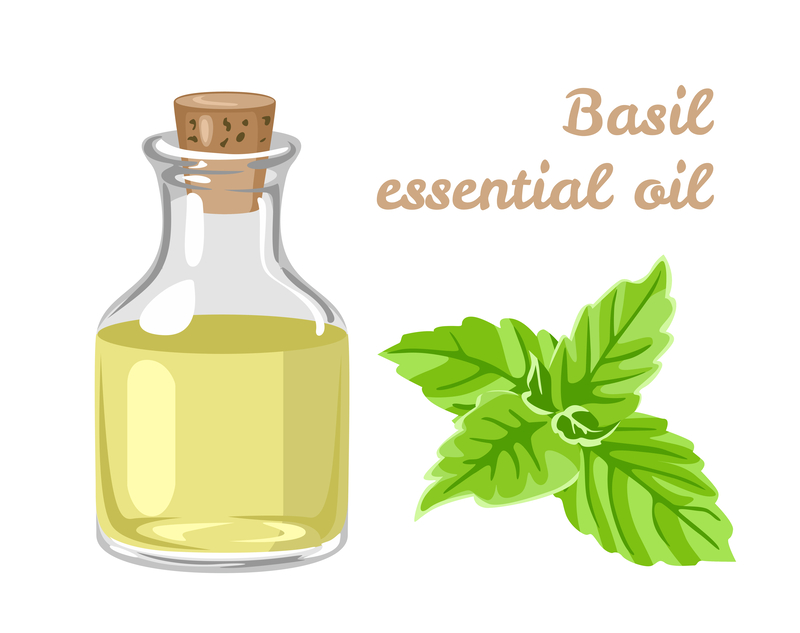Basil
Sweet Basil Essential Oil in Chinese Medicine
Common Name: Sweet Basil
Botanical Name: Ocimum basilicum
Pin Yin Name: Tián luólè
Main Acupressure Channels Activated by Sweet Basil Essential Oil:
Water Element (Kidney, Bladder), Wood Element (Liver, Gallbladder), Earth Element (Stomach, Spleen), Metal Element (Lung)
Learn How to Use Self-Acupressure Linked Here!
- Apply the Sinus Acupressure Stick to Acupressure Point Large Intestine 20
- Apply the Metal Element Acupressure Stick to Acupressure Point Lung 7
- Apply the Earth Element Acupressure Stick to Acupressure Point Spleen 9
![]()
Benefits of Sweet Basil Essential Oils in Chinese Medicine
Most people think of basil as a culinary herb, but it is also a powerful medicinal herb. The essential oils of sweet basil is not as appealing as the fresh herb but carries many health benefits. Because of its warming nature, it can be applied to the lower abdomen to warm the uterus in the case of Coldness cause infertility or cramps. It is anti-bacterial-antifungal and can be added to mouth rinses for gum disease and tooth infections. It is antispasmodic in nervous indigestive and respiratory disorders. It cleanses uric acid and helps to clear lymphatic congestion.
Properties: Warm, pungent, astringent, sweet, bitter, drying
Nature: Restoring, awakening, stimulating, assertive, clarifying, uplifting, reviving, refreshing, strengthening, motivational, cheerful, strong, trustworthy, decisive, purposeful, confident, spiritual, intellectual
![]()
Diseases, Emotional Imbalances, and Pain Syndromes Treated with Sweet Basil Essential Oil in Chinese Medicine
According to Traditional Chinese Medicine, each energetic organ system is assigned to one of the Five Elements. Each element has both physical and emotional symptoms that would indicate imbalances in one or more of the related organ systems. Learn more about the Five Elements here!
Water Element Energetic Organ Systems: Kidney, Urinary Bladder
Energetic Organ Systems: Kidney, Urinary Bladder
Wood Element Energetic Organ Systems: Liver, Gallbladder
- Low blood pressure
- Headaches
- Nervous depression
- IBS
- Colitis with mucous
Fire Element Energetic Organ Systems: Heart, Small Intestine, Pericardium, San Jiao
- Memory loss
- Shock
Earth Element Energetic Organ Systems: Spleen, Stomach
- Weak muscle tone
- Sinus congestion
- Stagnant Stomach Qi causing food stagnation
- Poor digestion of meats-protein
- Nausea
Metal Element Energetic Organ Systems: Lung, Large Intestine
- Low self-esteem
- Wheezing
- Loss of smell
- Cough
- Asthma
- Bronchitis
- Lung Phlegm
- Lung infections
- Chronic sinusitis
![]()
Plant description: Tender annual easily grown from seed that loves heat and full sun. The fresh leaves can be put through a juicer to produce a highly effective cough syrup that is mixed with honey and stored for six months in the refrigerator.
Part used: Leaves
Note: Middle
Safety and Contraindications
- No known cumulative toxicity used topically
- Dilute to 6% so not to irritate the skin
- Recommendations for topical use only
- Pregnant or nursing women and children-infants should only use essential oils under the guidance of their local practitioner.
![]()
Sakkas H, Papadopoulou C. Antimicrobial Activity of Basil, Oregano, and Thyme Essential Oils. J Microbiol Biotechnol. 2017 Mar 28;27(3):429-438. doi: 10.4014/jmb.1608.08024. PMID: 27994215.
Ahmadifard M, Yarahmadi S, Ardalan A, Ebrahimzadeh F, Bahrami P, Sheikhi E. The Efficacy of Topical Basil Essential Oil on Relieving Migraine Headaches: A Randomized Triple-Blind Study. Complement Med Res. 2020;27(5):310-318. English. doi: 10.1159/000506349. Epub 2020 Mar 10. PMID: 32155616.
Bona E, Cantamessa S, Pavan M, Novello G, Massa N, Rocchetti A, Berta G, Gamalero E. Sensitivity of Candida albicans to essential oils: are they an alternative to antifungal agents? J Appl Microbiol. 2016 Dec;121(6):1530-1545. doi: 10.1111/jam.13282. Epub 2016 Oct 24. PMID: 27568869.
Varney E, Buckle J. Effect of inhaled essential oils on mental exhaustion and moderate burnout: a small pilot study. J Altern Complement Med. 2013 Jan;19(1):69-71. doi: 10.1089/acm.2012.0089. Epub 2012 Nov 9. PMID: 23140115.
Sestili P, Ismail T, Calcabrini C, Guescini M, Catanzaro E, Turrini E, Layla A, Akhtar S, Fimognari C. The potential effects of Ocimum basilicum on health: a review of pharmacological and toxicological studies. Expert Opin Drug Metab Toxicol. 2018 Jul;14(7):679-692. doi: 10.1080/17425255.2018.1484450. Epub 2018 Jun 11. PMID: 29865879.
This information has not been evaluated by the Food and Drug Administration. This information is not intended to diagnose, treat, cure, or prevent any disease.
